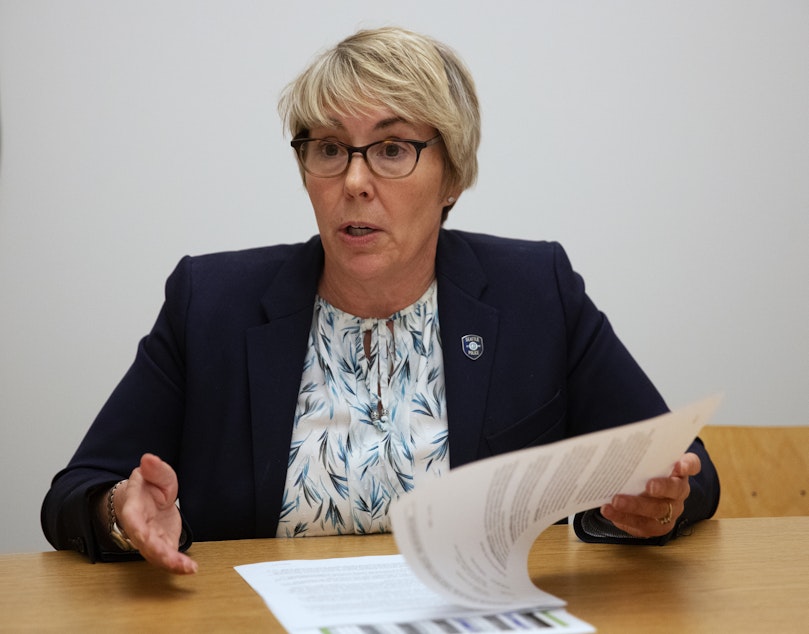Seattle police watchdog investigating leak of memo detailing sexual assault staffing crisis

This story was co-published by KUOW and The Seattle Times.
The Seattle police sergeant who wrote a memo detailing the severe understaffing of the department’s sexual assault and child abuse unit is now the subject of a leak investigation from the Office of Police Accountability.
Sgt. Pamela St. John wrote the memo in April, when she informed the department’s top brass, including interim chief Adrian Diaz, that her unit was so understaffed that she had to stop assigning sexual assault cases with adult victims to detectives. KUOW and The Seattle Times published a copy of the memo earlier this month.
Office of Police Accountability (OPA) spokesperson Katie Wieliczkiewicz said the civilian-run watchdog office had launched an investigation over “allegations that an employee provided a memo to media or spoke with media representatives without approval from the Chain of Command.” She refused to confirm the subject of the investigation or name the complainant, but KUOW and The Seattle Times learned of it from SPD sources.
It is a violation of SPD policy to release information to the media without authorization, but leak investigations are uncommon.
Sponsored
The Seattle Police Department refused to comment about the OPA complaint made against St. John, citing the active investigation. St. John did not respond to a request for comment.
The complaint against St. John landed after KUOW and The Seattle Times reporters met with Assistant Chief Deanna Nollette on May 25 to discuss St. John’s memo and the short staffing within the sexual assault and child abuse unit. KUOW and The Seattle Times and did not reveal the source of the leak. Nollette slammed the content of the memo as “not accurate” and a “gross oversimplification.”
Yet a detective in the unit confirmed to The Seattle Times and KUOW that dozens of sexual assault cases involving adults continued to languish.
The detective described a unit plagued by low morale, exacerbated by the fact that sexual assault detectives were, and continue to be, drafted for traffic and security details at sports games and other major events. While investigative units have shrunk at the department amid an exodus of officers, police leadership has shored up patrol and positions that respond to homeless encampments.
Since 2020 the department has lost more than 400 sworn staff, including at least 65 detectives.
Sponsored
A day after the story about the memo was published, interim chief Adrian Diaz said in a statement that once he learned about the unit’s understaffing in April, he took steps to remedy the situation — including the addition of another detective to the unit this month.
Since the memo became public, however, advocates have questioned the department’s priorities and said they’ve felt “gaslit” by officials’ public stances on sexual assault. Mayor Bruce Harrell has called the sexual assault unit’s staffing “unacceptable” and vowed to meet with advocates to address the stalled sexual assault cases.
Jamie Housen, a spokesperson from Harrell’s office, said the mayor’s office had not been made aware of the investigation into the author of the memo.
“Your email question is the first our office is hearing about this complaint and potential investigation,” Housen wrote by email, adding that the mayor’s office has no authority over OPA investigations.
Advocates for survivors of sexual assault expressed frustration with the leak investigation.
Sponsored
“It’s shameful and disappointing that instead of focusing on increasing SPD capacity to investigate reported sexual assault cases, the focus is instead to investigate Sgt. St. John for simply raising issues her department is facing,” Sexual Violence Law Center executive director Riddhi Mukhopadhyay said.
“It’s also concerning that SPD’s position is that this memo should not have been made public — that’s how I’m interpreting this investigation of the leak.”
Past Seattle police leaders have launched wide-reaching, yet unsuccessful efforts to root out leaks to the media. In 2011, the department hired an outside law firm to investigate a leak to KING 5 about potential discipline involving an officer who used a racial slur in threatening a Latino man during a robbery investigation.
That investigation cost $12,000 and did not find the source of the leak; the department also later settled a civil rights lawsuit brought by the subject of the racial slur for $150,000.
The same year, the department analyzed 120,000 department phone records to try to identify a string of leaks to news media. Seattle police said at the time that these leaks threatened the investigation into the killing of Seattle police officer Timothy Brenton, a separate investigation into the killing of four Lakewood police officers and another issue involving a search warrant.
Sponsored
The leak investigation uncovered two contacts with news media, including a Seattle Times reporter who did not cooperate with the investigation, but the OPA found the department’s evidence inconclusive. The department declined at the time to detail how much time and money had been dedicated to this search.
Sydney Brownstone: 206-464-3225 or sbrownstone@seattletimes.com; on Twitter: @sydbrownstone.
Ashley Hiruko: 206-574-8007 or hiruko@kuow.org;





